Memoir of John Shakespear Bartley, 1916-1919 - Part 20
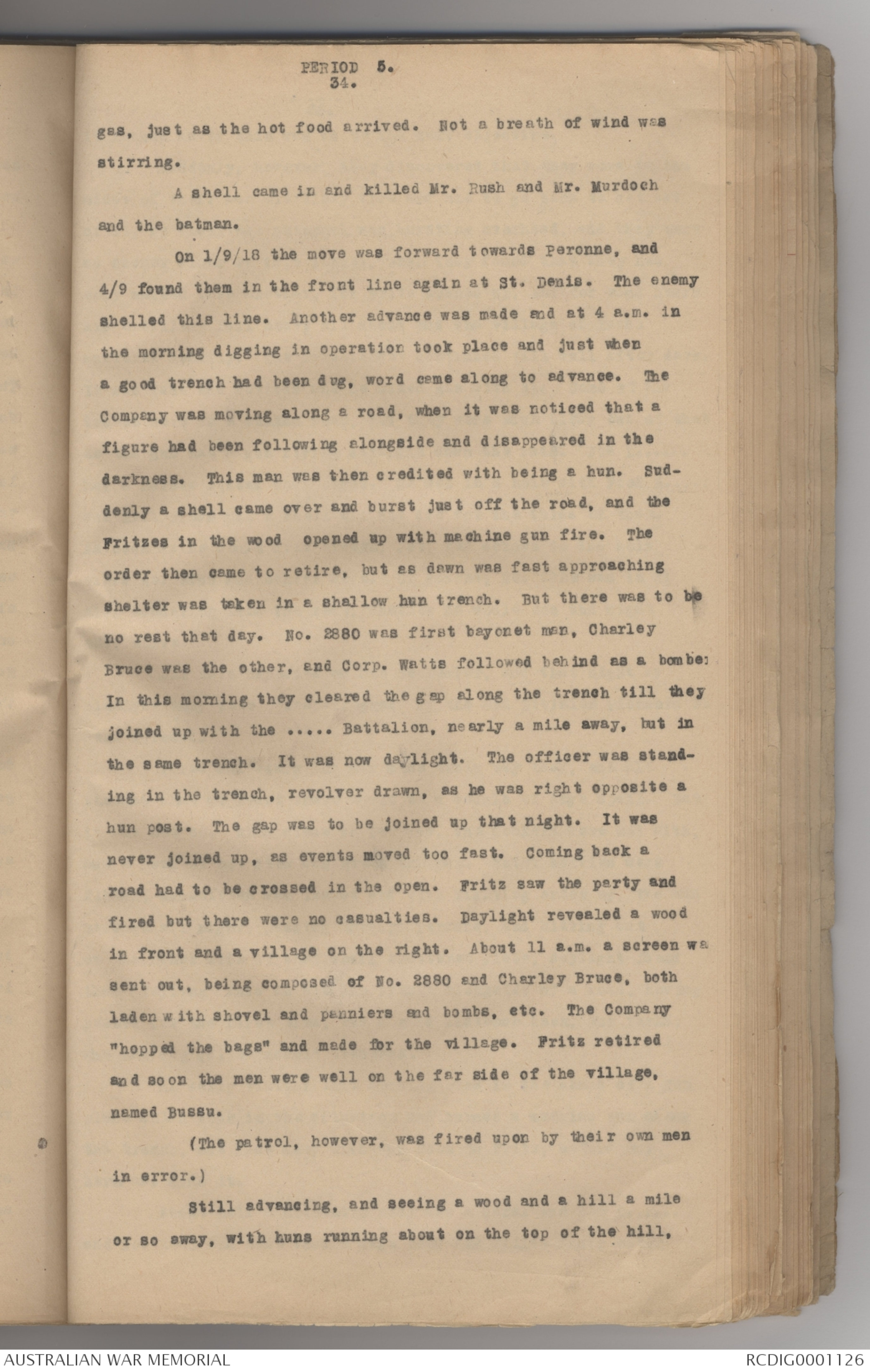
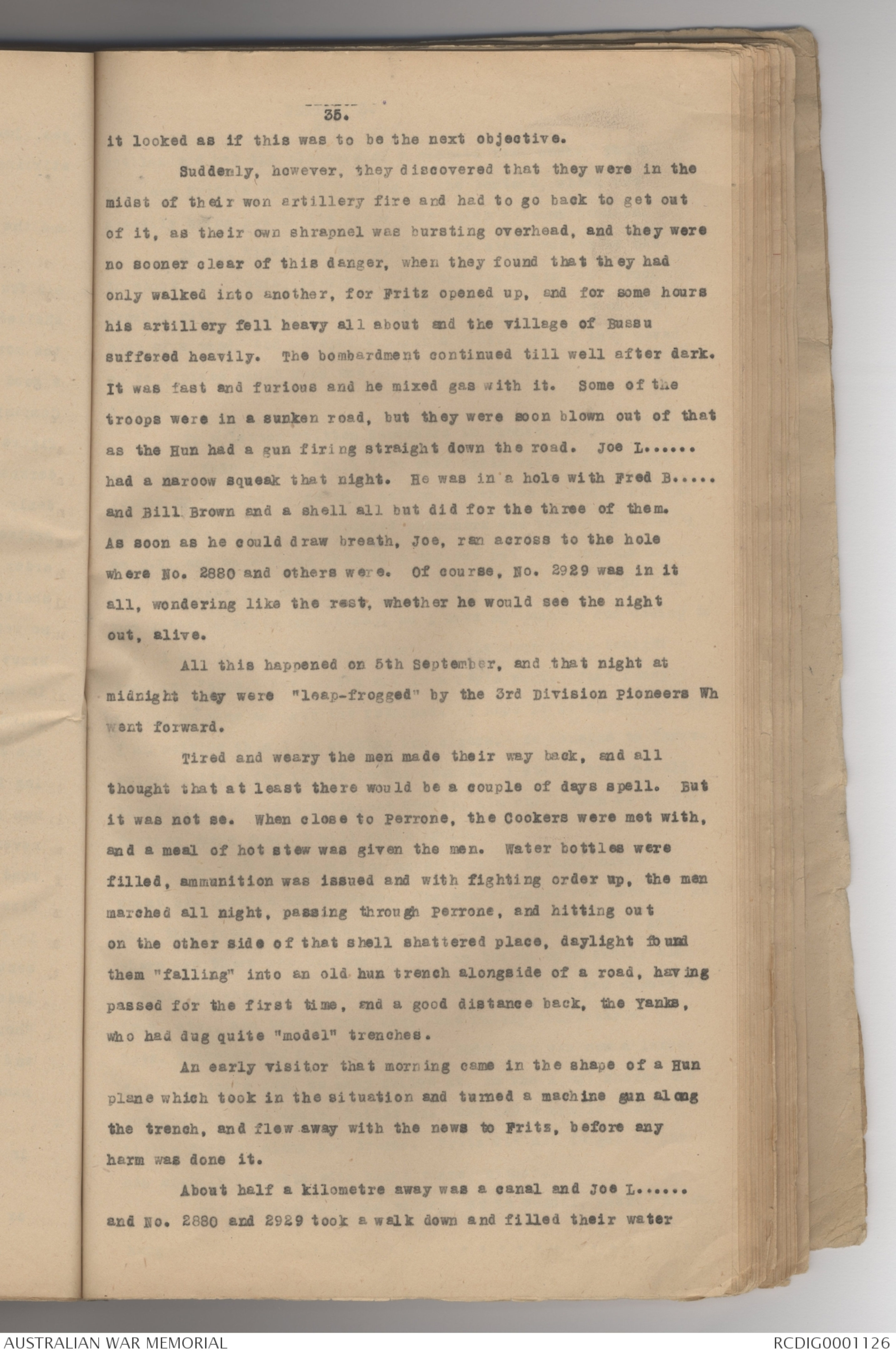
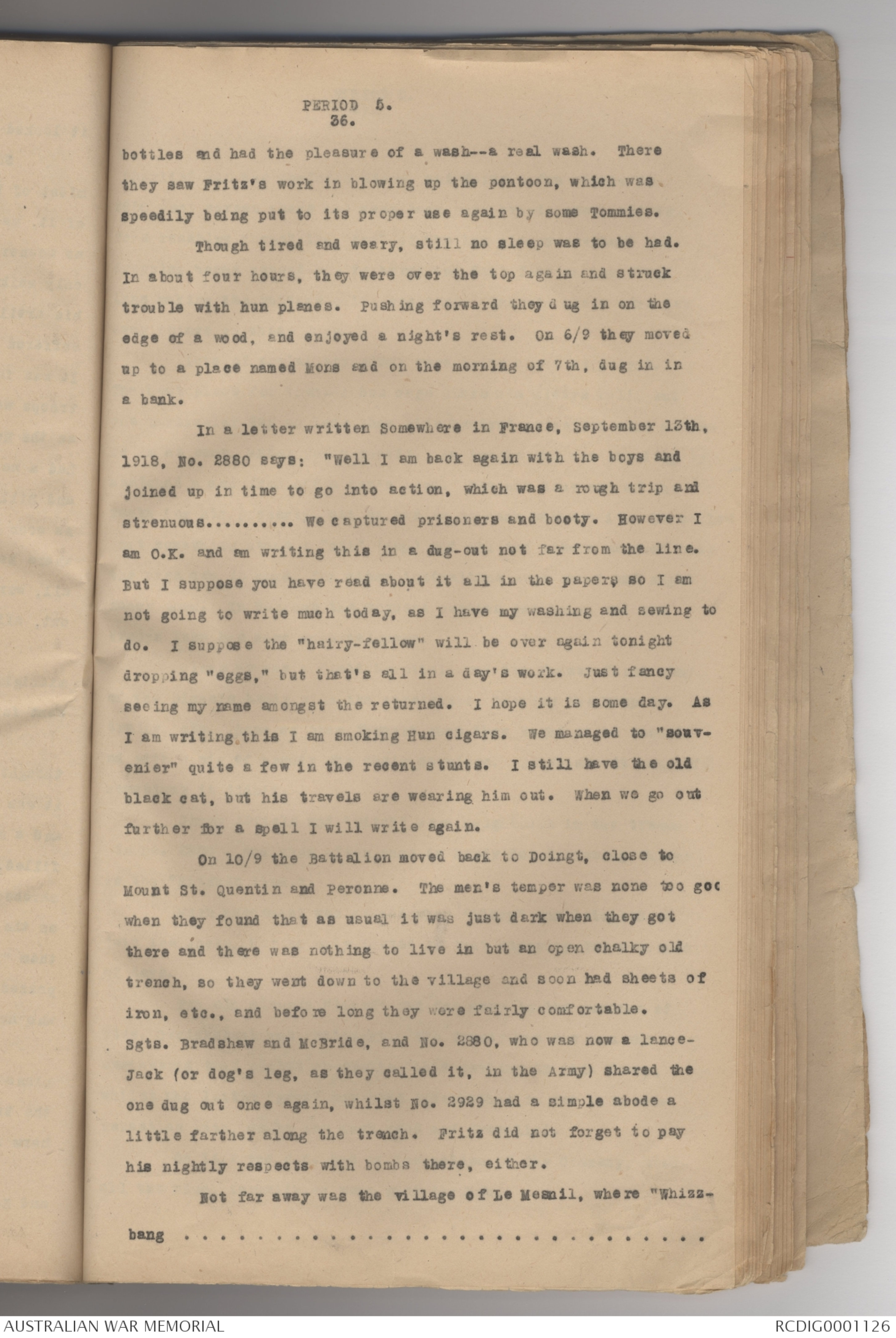
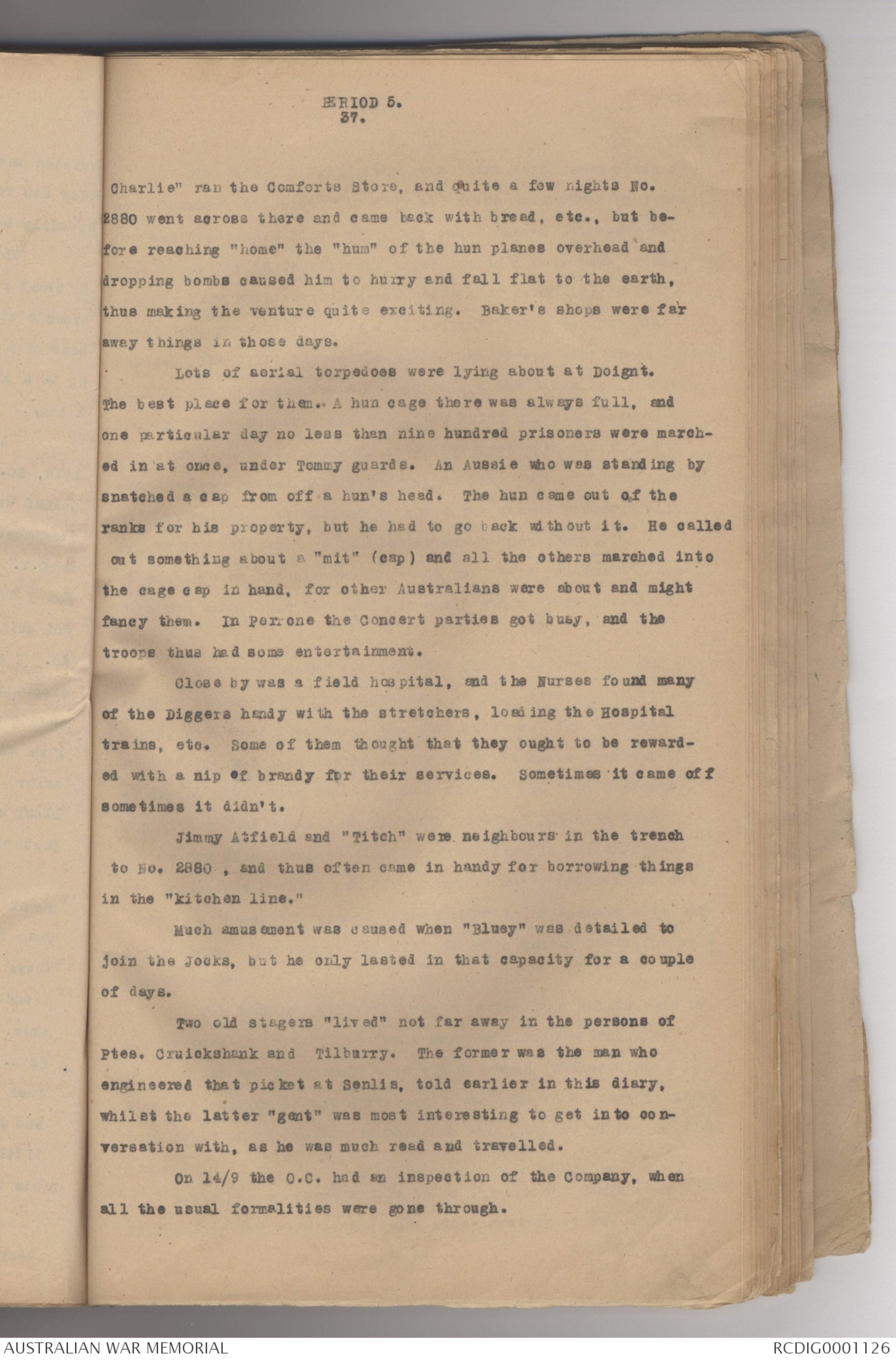
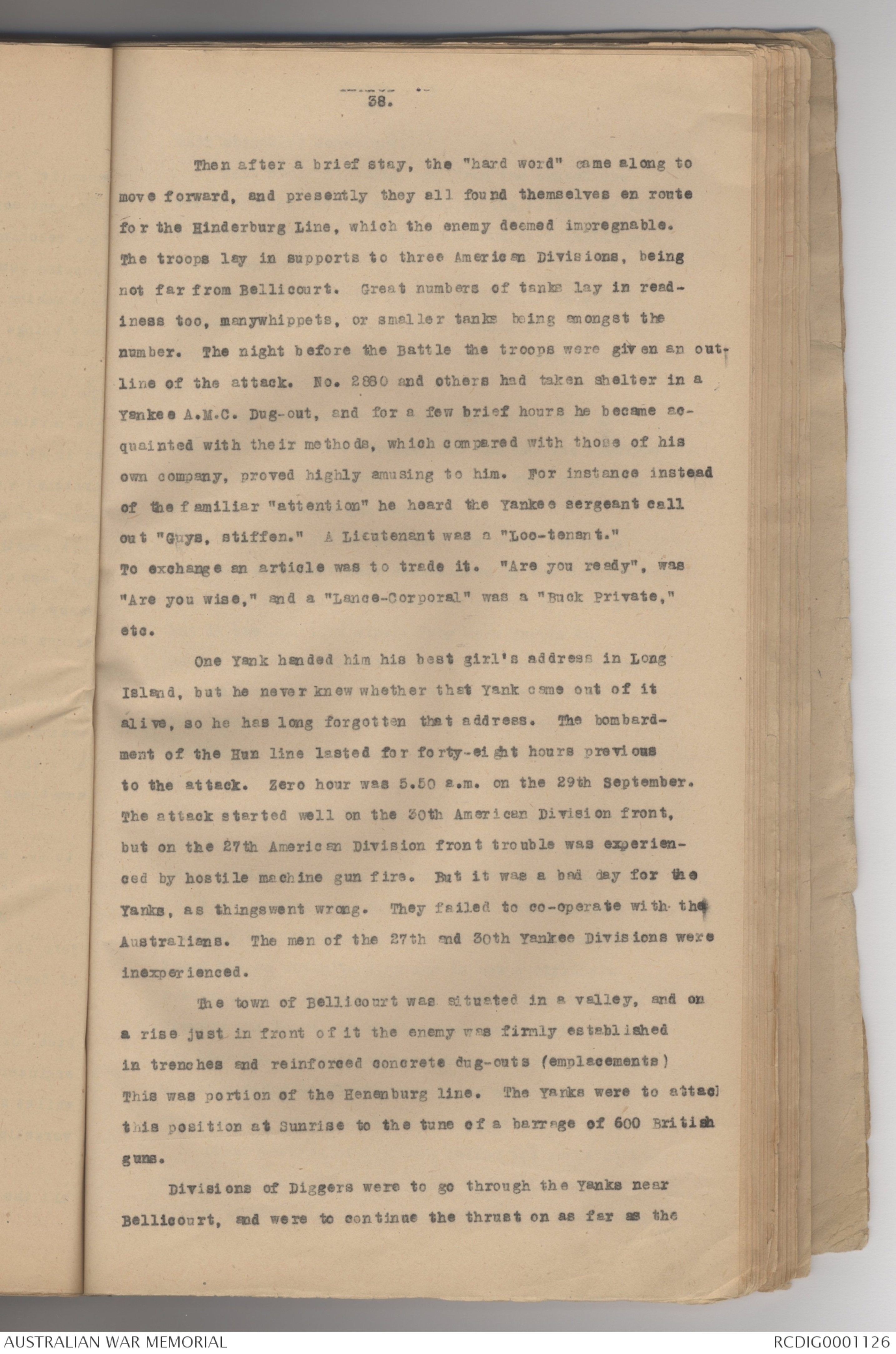
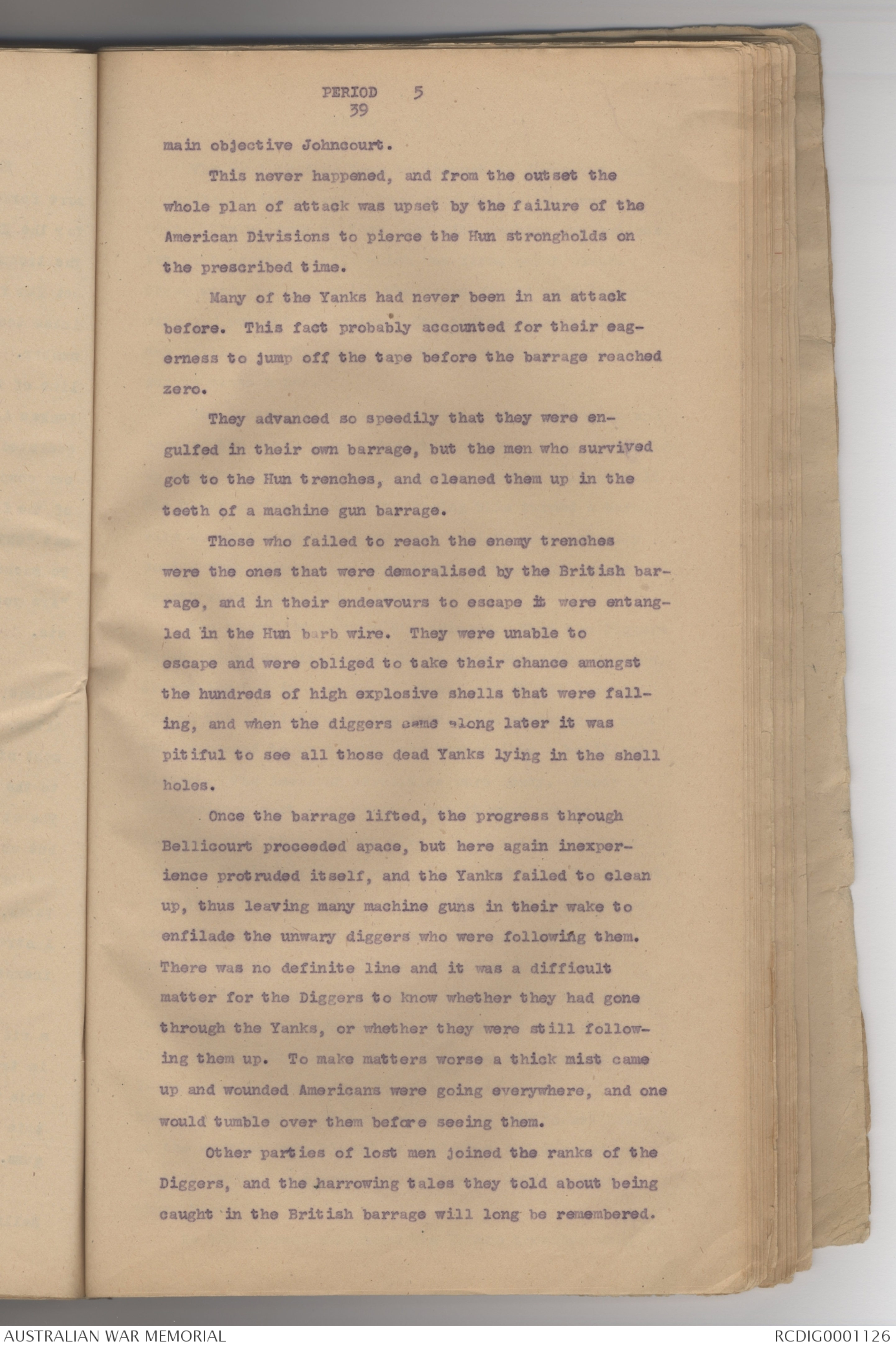
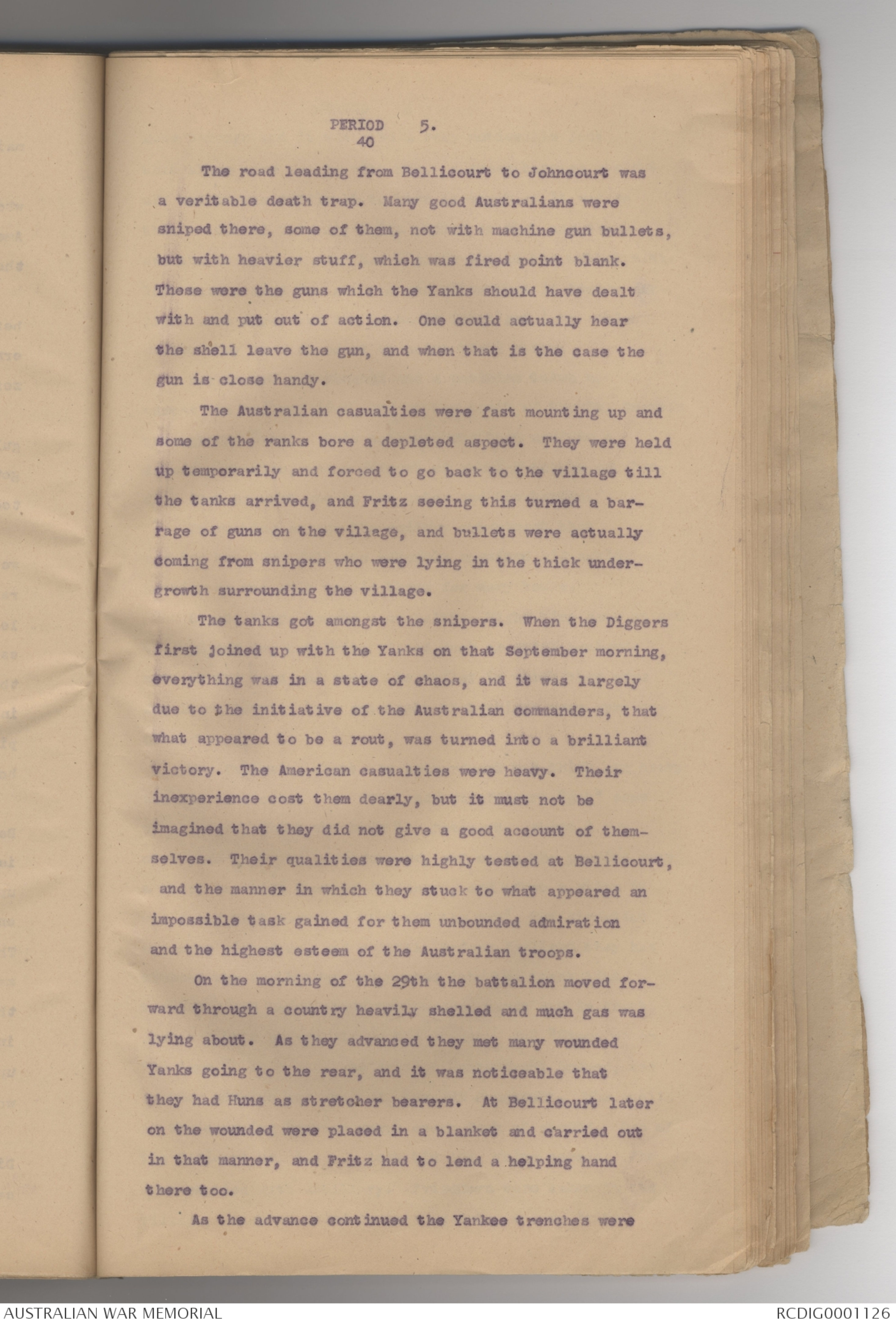
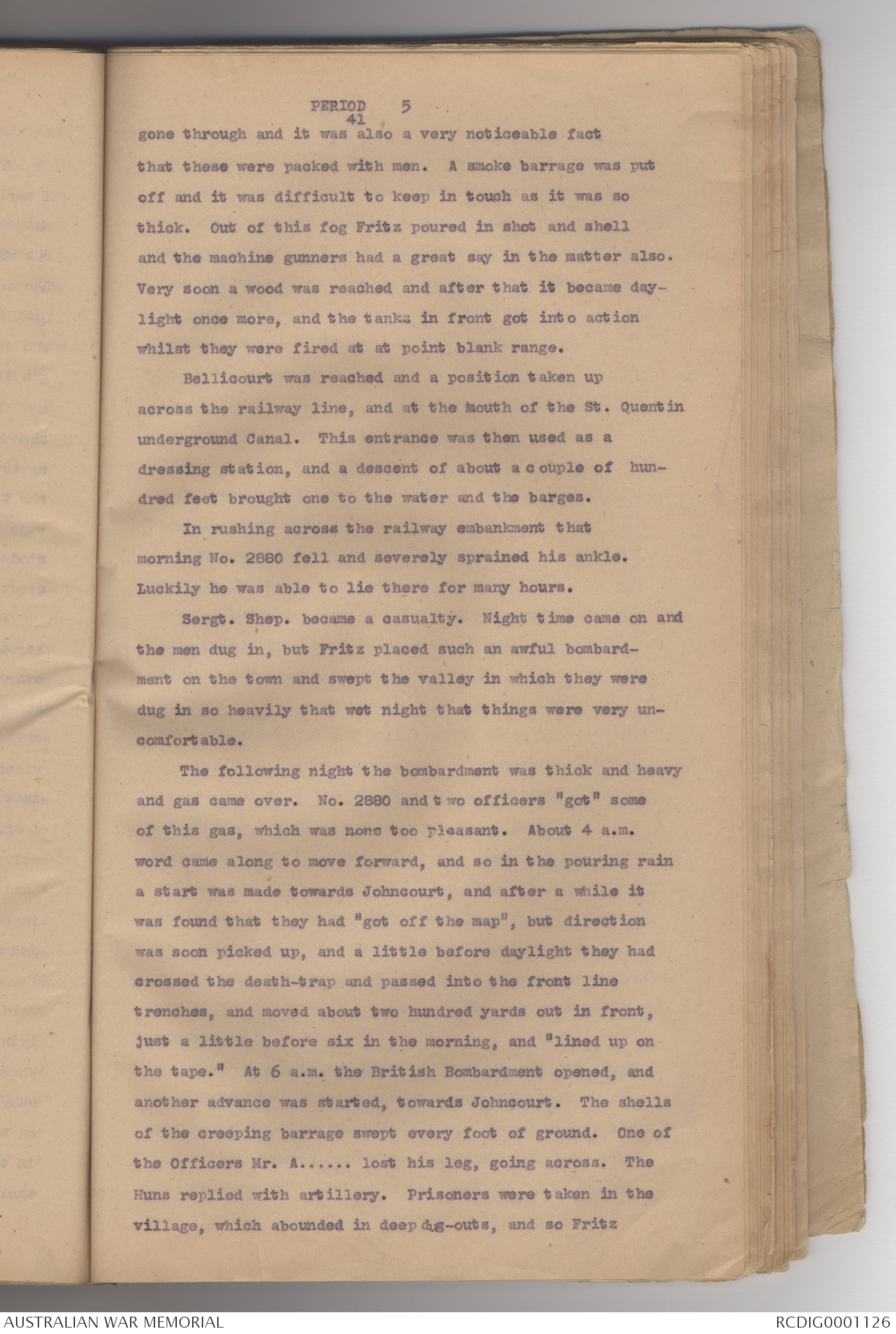
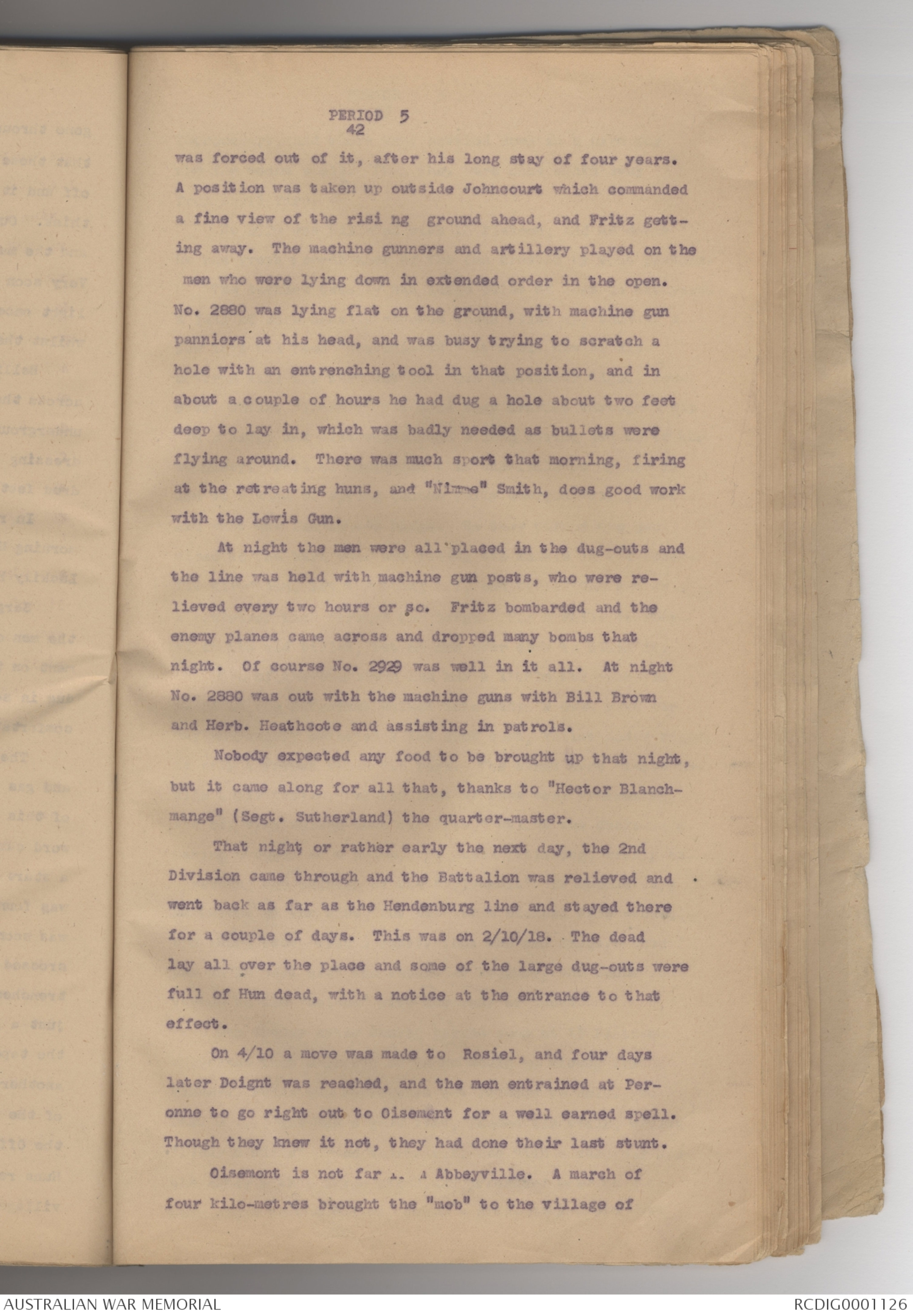
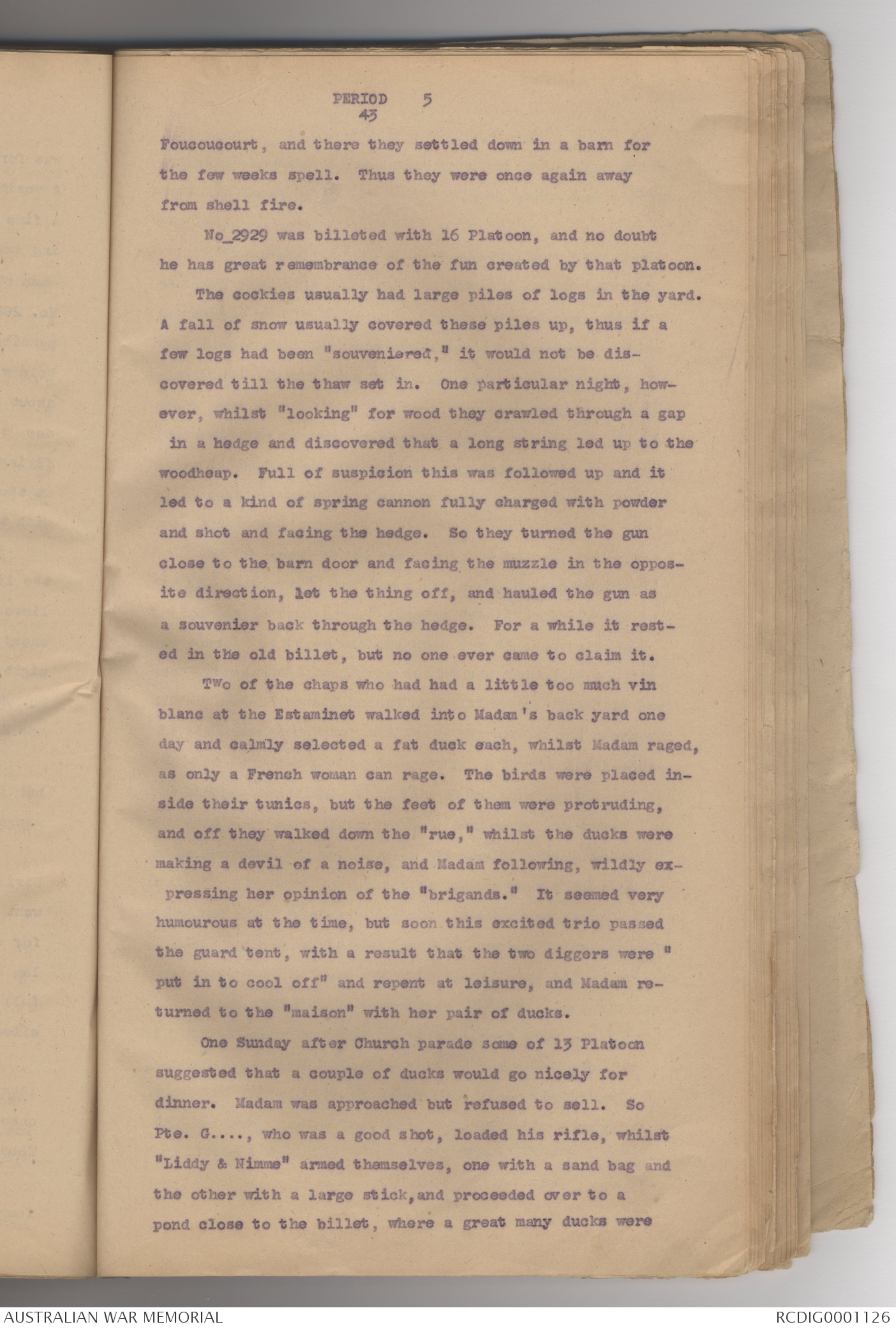
PERIOD 5.
34.
gas, just as the hot food arrived. Not a breath of wind was
stirring.
A shell came in and killed Mr. Rush and Mr. Murdoch
and the batman.
On 1/9/18 the move was forward towards Peronne, and
4/9 found them in the front line again at St. Denis. The enemy
shelled this line. Another advance was made and at 4 a.m. in
the morning digging in operation took place and just when
a good trench had been dug, word came along to advance. The
Company was moving along a road, when it was noticed that a
figure had been following alongside and disappeared in the
darkness. This man was then credited with being a hun. Suddenly
a shell came over and burst just off the road, and the
Fritzes in the wood opened up with machine gun fire. The
order then came to retire, but as dawn was fast approaching
shelter was taken in a shallow hun trench. But there was to be
no rest that day. No. 2880 was first bayonet man, Charley
Bruce was the other, and Corp. Watts followed behind as a bomber
In this morning they cleared the gap along the trench till they
joined up with the ..... Battalion, nearly a mile away, but in
the same trench. It was now daylight. The officer was standing
in the trench, revolver drawn, as he was right opposite a
hun post. The gap was to be joined up that night. It was
never joined up, as events moved too fast. Coming back a
road had to be crossed in the open. Fritz saw the party and
fired but there were no casualties. Daylight revealed a wood
in front and a village on the right. About 11 a.m. a screen was
sent out, being composed of No. 2880 and Charley Bruce, both
laden with shovel and panniers and bombs, etc. The Company
"hopped the bags" and made for the village. Fritz retired
and soon the men were well on the far side of the village,
named Bussu.
(The patrol, however, was fired upon by their own men
in error.)
Still advancing, and seeing a wood and a hill a mile
or so away, with huns running about on the top of the hill,
35.
it looked as if this was to be the next objective.
Suddenly, however, they discovered that they were in the
midst of their won artillery fire and had to go back to get out
of it, as their own shrapnel was bursting overhead, and they were
no sooner clear of this danger, when they found that they had
only walked into another, for Fritz opened up, and for some hours
his artillery fell heavy all about and the village of Bussu
suffered heavily. The bombardment continued till well after dark.
It was fast and furious and he mixed gas with it. Some of the
troops were in a sunken road, but they were soon blown out of that
as the Hun had a gun firing straight down the road. Joe L. . . . . .
had a naroow squeak that night. He was in'a hole with Fred B. . . . .
and Bill Brown and a shell all but did for the three of them.
As soon as he could draw breath, Joe, ran across to the hole
where No. 2880 and others were. Of course, No. 2929 was in it
all, wondering like the rest, whether he would see the night
out, alive.
All this happened on 5th September, and that night at
midnight they were "leap-frogged" by the 3rd Division Pioneers Wh
went forward.
Tired and weary the men made their way back, and all
thought that at least there would be a couple of days spell. But
it was not se. When close to Perrone, the Cookers were met with,
and a meal of hot stew was given the men. Water bottles were
filled, ammunition was issued and with fighting order up, the men
marched all night, passing through Perrone, and hitting out
on the other side of that shell shattered place, daylight found
them "falling" into an old hun trench alongside of a road, having
passed for the first time, and a good distance back, the Yanks,
who had dug quite "model" trenches.
An early visitor that morning came in the shape of a Hun
plane which took in the situation and turned a machine gun along
the trench, and flew away with the news to Fritz, before any
harm was done it.
About half a kilometre away was a canal and Joe L. . . . . .
and No. 2880 and 2929 took a walk down and filled their water
PERIOD 5.
36.
bottles and had the pleasure of a wash--a real wash. There
they saw Fritz's work in blowing up the pontoon, which was.
speedily being put to its proper use again by some Tommies.
Though tired and weary, still no sleep was to be had.
In about four hours, they were over the top again and struck
trouble with hun planes. Pushing forward they dug in on the
edge of a wood, and enjoyed a night's rest. On 6/9 they moved
up to a place named Mons and on the morning of 7th, dug in in
a bank.
In a letter written Somewhere in France, September 13th,
1918, No. 2880 says: "Well I am back again with the boys and
joined up in time to go into action, which was a rough trip and
strenuous.......... We captured prisoners and booty. However I
am O.K. and am writing this in a dug-out not far from the line.
But I suppose you have read about it all in the papers so I am
not going to write much today, as I have my washing and sewing to
do. I suppose the "hairy-fellow" will be over again tonight
dropping "eggs," but that's all in a day's work. Just fancy
seeing my, name amongst the returned. I hope it is some day. As
I am writing this I am smoking Hun cigars. We managed to "souvenier"
quite a few in the recent stunts. I still have the old
black cat, but his travels are wearing him out. When we go out
further for a spell I will write again.
On 10/9 the Battalion moved back to Doingt, close to
Mount St. Quentin and Peronne. The men's temper was none too goo
when they found that as usual it was just dark when they got
there and there was nothing to live in but an open chalky old
trench, so they went down to the village and soon had sheets of
iron, etc., and before long they were fairly comfortable.
Sgts. Bradshaw and McBride, and No. 2880, who was now a lance-
Jack (or dog's leg, as they called it, in the Army) shared the
one dug out once again, whilst No. 2929 had a simple abode a
little farther along the trench. Fritz did not forget to pay
his nightly respects with bombs there, either.
Not far away was the village of Le Mesnil, where "Whizz-
bang . . . . . . . . . . . . . . . . . . . . .
PERIOD 5.
37.
Charlie" ran the Comforts Store, and quite a few nights No.
2880 went across there and came back with bread, etc., but before
reaching "home" the "hum" of the hun planes overhead and
dropping bombs caused him to hurry and fall flat to the earth,
thus making the venture quite exciting. Baker's shops were far
away things in those days.
Lots of serial torpedoes were lying about at Doignt.
The best place for them. A hun cage there was always full, and
one particular day no less than nine hundred prisoners were marched
in at once, under Tommy guards. An Aussie who was standing by
snatched a cap from off a hun's head. The hun came out of the
ranks for his property, but he had to go back without it. He called
out something about a "mit" (cap) and all the others marched into
the cage cap in hand, for other Australians were about and might
fancy them. In Perrone the Concert parties got busy, and the
troops thus had some entertainment.
Close by was a field hospital, and the Nurses found many
of the Diggers handy with the stretchers, loading the Hospital
trains, etc. Some of them thought that they ought to be rewarded
with a nip of brandy for their services. Sometimes it came off
sometimes it didn't.
Jimmy Atfield and "Titch" were neighbours in the trench
to No. 2880, and thus often came in handy for borrowing things
in the "kitchen line."
Much amusement was caused when "Bluey" was detailed to
join the Jocks, but he only lasted in that capacity for a couple
of days.
Two old stagers "lived" not far away in the persons of
Ptes. Cruickshank and Tilburry. The former was the man who
engineered that picket at Senlis, told earlier in this diary,
whilst the latter "gent" was most interesting to get into conversation
with, as he was much read and travelled.
On 14/9 the O.C. had an inspection of the Company, when
all the usual formalities were gone through.
38.
Then after a brief stay, the "hard word" came along to
move forward, and presently they all found themselves en route
for the Hinderburg Line, which the enemy deemed impregnable.
The troops lay in supports to three American Divisions, being
not far from Bellicourt. Great numbers of tanks lay in readiness
too, many whippets, or smaller tanks being amongst the
number. The night before the Battle the troops were given an outline
of the attack. No. 2880 and others had taken shelter in a
Yankee A.M.C. Dug-out, and for a few brief hours he became acquainted
with their methods, which compared with those of his
own company, proved highly amusing to him. For instance instead
of the familiar "attention" he heard the Yankee sergeant call
out "Guys, stiffen." A Lieutenant was a "Loo-tenant."
To exchange an article was to trade it. "Are you ready", was
"Are you wise," and a "Lance-Corporal" was a "Buck Private,"
etc.
One Yank handed him his best girl's address in Long
Island, but he never knew whether that Yank came out of it
alive, so he has long forgotten that address. The bombardment
of the Hun line lasted for forty-eight hours previous
to the attack. Zero hour was 5.50 a.m. on the 29th September.
The attack started well on the 30th American Division front,
but on the 27th American Division front trouble was experienced
by hostile machine gun fire. But it was a bad day for the
Yanks, as thingswent wrong. They failed to co-operate with the
Australians. The men of the 27th and 30th Yankee Divisions were
inexperienced.
The town of Bellicourt was situated in a valley, and on
a rise just in front of it the enemy was firmly established
in trenches and reinforced concrete dug outs (emplacements)
This was portion of the Henenburg line. The Yanks were to attack
this position at Sunrise to the tune of a barrage of 600 British
guns.
Divisions of Diggers were to go through the Yanks near
Bellicourt, and were to continue the thrust on as far as the
PERIOD 5
39
main objective Johncourt.
This never happened, and from the outset the
whole plan of attack was upset by the failure of the
American Divisions to pierce the Hun strongholds on
the prescribed time.
Many of the Yanks had never been in an attack
before. This fact probably accounted for their eagerness
to jump off the tape before the barrage reached
zero.
They advanced so speedily that they were engulfed
in their own barrage, but the men who survived
got to the Hun trenches, and cleaned them up in the
teeth of a machine gun barrage.
Those who failed to reach the enemy trenches
were the ones that were demoralised by the British barrage,
and in their endeavours to escape it were entangled
in the Hun barb wire. They were unable to
escape and were obliged to take their chance amongst
the hundreds of high explosive shells that were falling,
and when the diggers came along later it was
pitiful to see all those dead Yanks lying in the shell
holes.
Once the barrage lifted, the progress through
Bellicourt proceeded apace, but here again inexperience
protruded itself, and the Yanks failed to clean
up, thus leaving many machine guns in their wake to
enfilade the unwary diggers who were following them.
There was no definite line and it was a difficult
matter for the Diggers to know whether they had gone
through the Yanks, or whether they were still following
them up. To make matters worse a thick mist came
up and wounded Americans were going everywhere, and one
would tumble over them before seeing them.
Other parties of lost men joined the ranks of the
Diggers, and the harrowing tales they told about being
caught in the British barrage will long be remembered.
PERIOD 5.
40
The road leading from Bellicourt to Johncourt was
a veritable death trap. Many good Australians were
sniped there, some of them, not with machine gun bullets,
but with heavier stuff, which was fired point blank.
These were the guns which the Yanks should have dealt
with and put out of action. One could actually hear
the shell leave the gun, and when that is the case the
gun is close handy.
The Australian casualties were fast mounting up and
some of the ranks bore a depleted aspect. They were held
up temporarily and forced to go back to the village till
the tanks arrived, and Fritz seeing this turned a barrage
of guns on the village, and bullets were actually
coming from snipers who were lying in the thick undergrowth
surrounding the village.
The tanks got amongst the snipers. When the Diggers
first joined up with the Yanks on that September morning,
everything was in a state of chaos, and it was largely
due to the initiative of the Australian commanders, that
what appeared to be a rout, was turned into a brilliant
victory. The American casualties were heavy. Their
inexperience cost them dearly, but it must not be
imagined that they did not give a good account of themselves.
Their qualities were highly tested at Bellicourt,
and the manner in which they stuck to what appeared an
impossible task gained for them unbounded admiration
and the highest esteem of the Australian troops.
On the morning of the 29th the battalion moved forward
through a country heavily shelled and much gas was
lying about. As they advanced they met many wounded
Yanks going to the rear, and it was noticeable that
they had Huns as stretcher bearers. At Bellicourt later
on the wounded were placed in a blanket and carried out
in that manner, and Fritz had to lend a helping hand
there too.
As the advance continued the Yankee trenches were
PERIOD 5
41
gone through and it was also a very noticeable fact
that these were packed with men. A smoke barrage was put
off and it was difficult to keep in touch as it was so
thick. Out of this fog Fritz poured in shot and shell
and the machine gunners had a great say in the matter also.
Very soon a wood was reached and after that it became daylight
once more, and the tanks in front got into action
whilst they were fired at at point blank range.
Bellicourt was reached and a position taken up
across the railway line, and at the mouth of the St. Quentin
underground Canal. This entrance was then used as a
dressing station, and a descent of about a couple of hundred
feet brought one to the water and the barges.
In rushing across the railway embankment that
morning No. 2880 fell and severely sprained his ankle.
Luckily he was able to lie there for many hours.
Sergt. Shep. became a casualty. Night time came on and
the men dug in, but Fritz placed such an awful bombardment
on the town and swept the valley in which they were
dug in so heavily that wet night that things were very uncomfortable.
The following night the bombardment was thick and heavy
and gas came over. No. 2880 and t wo officers "got" some
of this gas, which was none too pleasant. About 4 a.m.
word came along to move forward, and so in the pouring rain
a start was made towards Johncourt, and after a while it
was found that they had "got off the map", but direction
was soon picked up, and a little before daylight they had
crossed the death-trap and passed into the front line
trenches, and moved about two hundred yards out in front,
just a little before six in the morning, and "lined up on
the tape." At 6 a.m. the British Bombardment opened, and
another advance was started, towards Johncourt. The shells
of the creeping barrage swept every foot of ground. One of
the Officers Mr. A. . . . . . lost his leg, going across. The
Huns replied with artillery. Prisoners were taken in the
village, which abounded in deep dug-outs, and so Fritz
PERIOD 5
42
was forced out of it, after his long stay of four years.
A position was taken up outside Johncourt which commanded
a fine view of the rising ground ahead, and Fritz getting
away. The machine gunners and artillery played on the
men who were lying down in extended order in the open.
No. 2880 was lying flat on the ground, with machine gun
panniers at his head, and was busy trying to scratch a
hole with an entrenching tool in that position, and in
about a couple of hours he had dug a hole about two feet
deep to lay in, which was badly needed as bullets were
flying around. There was much sport that morning, firing
at the retreating huns, and "Nimme" Smith, does good work
with the Lewis Gun.
At night the men were all placed in the dug-outs and
the line was held with machine gun posts, who were relieved
every two hours or so. Fritz bombarded and the
enemy planes came across and dropped many bombs that
night. Of course No. 2929 was well in it all. At night
No. 2880 was out with the machine guns with Bill Brown
and Herb. Heathcote and assisting in patrols.
Nobody expected any food to be brought up that night,
but it came along for all that, thanks to "Hector Blanchmange"
(Segt. Sutherland) the quarter-master.
That night or rather early the next day, the 2nd
Division came through and the Battalion was relieved and
went back as far as the Hendenburg line and stayed there
for a couple of days. This was on 2/10/18. The dead
lay all over the place and some of the large dug-outs were
full of Hun dead, with a notice at the entrance to that
effect.
On 4/10 a move was made to Rosiel, and four days
later Doignt was reached, and the men entrained at Peronne
to go right out to Oisement for a well earned spell.
Though they knew it not, they had done their last stunt.
Oisemont is not far from Abbeyville. A march of
four kilo-metres brought the "mob" to the village of
PERIOD 5
43
Foucoucourt, and there they settled down in a barn for
the few weeks spell. Thus they were once again away
from shell fire.
No 2929 was billeted with 16 Platoon, and no doubt
he has great remembrance of the fun created by that platoon.
The cockies usually had large piles of logs in the yard.
A fall of snow usually covered these piles up, thus if a
few logs had been "souveniered," it would not be discovered
till the thaw set in. One particular night, however,
whilst "looking" for wood they crawled through a gap
in a hedge and discovered that a long string led up to the
woodheap. Full of suspicion this was followed up and it
led to a kind of spring cannon fully charged with powder
and shot and facing the hedge. So they turned the gun
close to the barn door and facing the muzzle in the opposite
direction, let the thing off, and hauled the gun as
a souvenier back through the hedge. For a while it rested
in the old billet, but no one ever came to claim it.
Two of the chaps who had had a little too much vin
blanc at the Estaminet walked into Madam's back yard one
day and calmly selected a fat duck each, whilst Madam raged,
as only a French woman can rage. The birds were placed inside
their tunics, but the feet of them were protruding,
and off they walked down the "rue," whilst the ducks were
making a devil of a noise, and Madam following, wildly expressing
her opinion of the "brigands." It seemed very
humourous at the time, but soon this excited trio passed
the guard tent, with a result that the two diggers were "
put in to cool off" and repent at leisure, and Madam returned
to the "maison" with her pair of ducks.
One Sunday after Church parade some of 13 Platoon
suggested that a couple of ducks would go nicely for
dinner. Madam was approached but refused to sell. So
Pte. G. . . . , who was a good shot, loaded his rifle, whilst
"Liddy & Nimme" armed themselves, one with a sand bag and
the other with a large stick, and proceeded over to a
pond close to the billet, where a great many ducks were
 Marisa Bortolotto
Marisa BortolottoThis transcription item is now locked to you for editing. To release the lock either Save your changes or Cancel.
This lock will be automatically released after 60 minutes of inactivity.